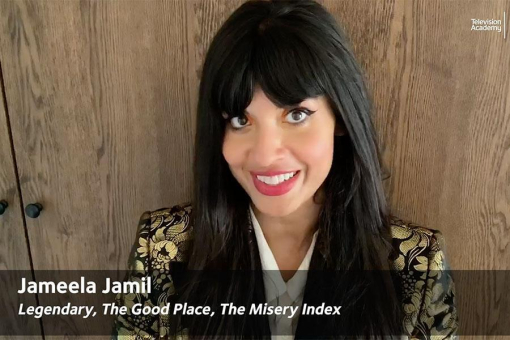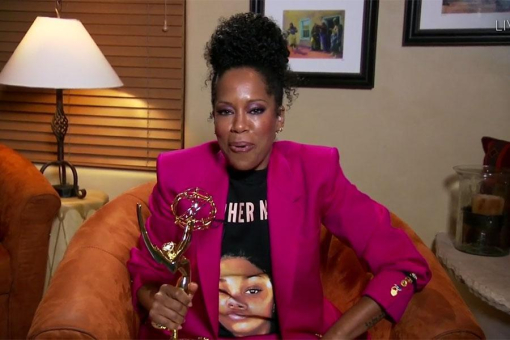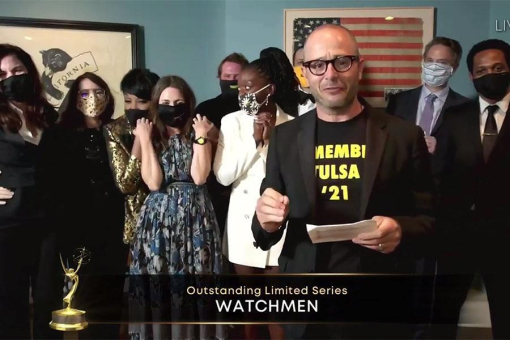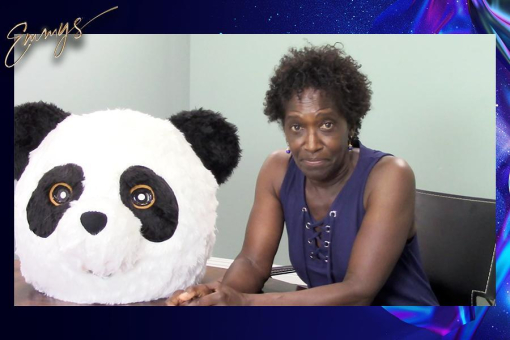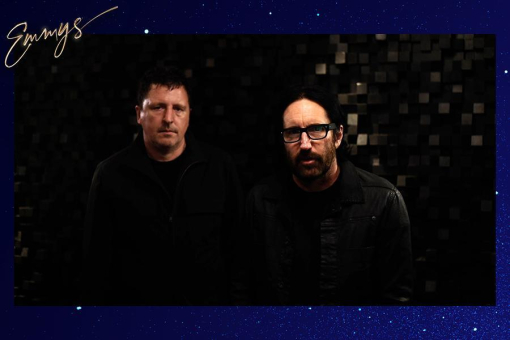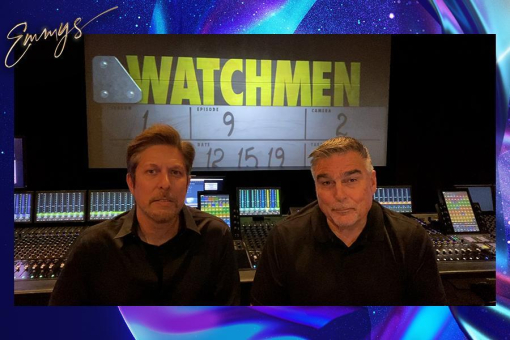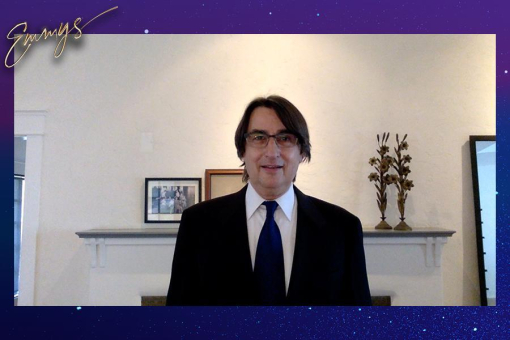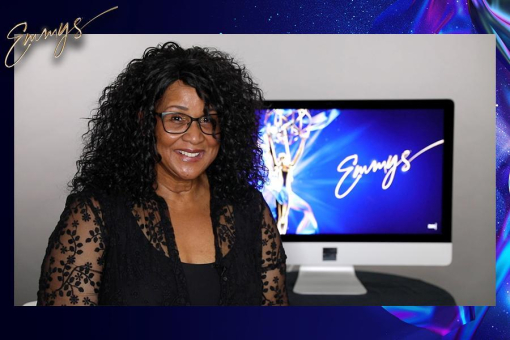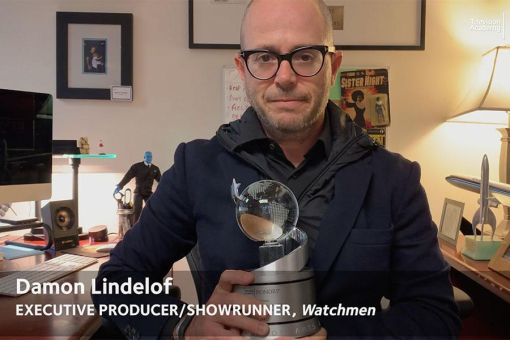Trent Reznor and Atticus Ross have been scoring film and television together for a decade.
As composers, building on Nine Inch Nails (the band Reznor formed in 1988, and which Ross has been a formal member of since 2016), they have established a clear aesthetic vision and relentless work ethic.
Their credits include the David Fincher films The Social Network, The Girl with the Dragon Tattoo, Gone Girl, and the upcoming Netflix release Mank, Pixar's Soul (release pushed to November), as well as television series Ken Burns' The Vietnam War, and HBO's Watchmen.
They took a character-based, song-based approach to conveying the required emotion with their first score, 2010's The Social Network. It earned them an Oscar.
Beyond developing a new set of tools and techniques, the composers find the collaborative nature of television and film production sometimes frustrating and often freeing.
"We found it is a release to not be in charge of certain things," says Reznor, "to work in service to something. You're inspired by the people working around you, and hopefully you inspired them, and that momentum and collaboration is something that feels different than Nine Inch Nails.
"It also means being able to let go of things. There are times when that becomes heartbreaking. That's taught us a lot about patience and understanding."
Reznor is notoriously obsessive about his work. While this ethos continues into their scoring, he and Ross believe a good score starts with an understanding of the director's vision.
"In our own world of Nine Inch Nails, we're the boss," says Reznor. "When we get brought into a new project, we're there in a supporting role."
"In our own world of Nine Inch Nails, we're the boss," says Reznor. "When we get brought into a new project, we're there in a supporting role. So we have to know what the director is thinking and what the role of the music is. It's a lot of listening."
"It's very much about getting into the head of the director and trying to understand what role music is going to play," says Ross.
Cultivating relationships has been crucial, not only with the director, but especially with the sound designer.
"The way we approach scores, and the instrumentation we use, is less traditional," says Reznor. "The music that we do often spills into sound design.
"In the Fincher films, for example, we've got a sound designer there we're good friends with. We'll go back and forth and say, 'hey, can you tune that floor cleaner to D?'.
"There are times in other camps when it does feel like everyone's got their guards up and there's a battle on the stage about who gets to be heard, but that's nonsense. We aren't here to take over sound design. Our goal is to work in concert with everyone and make something great."
"We are control freaks, but we are in collaboration," says Ross. "As far as the music goes, we're there every single minute of the process until the end."
The processed musical tension of Nine Inch Nails (which has amassed over 20 million album sales, multiple awards, and is slated for admission into the Rock and Roll Hall of Fame this year) has had a profound influence on the sound of popular music.
Their scores build on this manipulation of emotion through tension, almost becoming characters themselves.
The role of the music in Watchmen presented an opportunity to "dip into the toolbox of Nine Inch Nails a little bit," as Ross puts it, from how the music fit within the show to how that music was presented as a soundtrack, in the case of Watchmen, a triple album vinyl release.
I've always tried to approach every aspect I can touch about Nine Inch Nails with as much thought and care as possible," says Reznor, "from the feel of the cotton of the tee shirt in the merch booth to the production of the show live, to the liner notes in the record, and the little scratching on vinyl around the inside ring hiding secret messages.
"I've always tried to approach every aspect I can touch about Nine Inch Nails with as much thought and care as possible," says Reznor, "from the feel of the cotton of the tee shirt in the merch booth to the production of the show live, to the liner notes in the record, and the little scratching on vinyl around the inside ring hiding secret messages.
"So when we go into scoring things, we ask if we can be in charge of, or at least have a say in, how the eventual soundtrack record is presented.
"With Watchmen, it was clear that there's a lot of storytelling happening that isn't on the screen, certain details of this incredibly dense mythology that they created, that also fit perfectly like a puzzle with the original cannon of the graphic novel, and you just can't fit all that in a one-hour TV episode.
"We can make these vinyl things artifacts from that world."
Episode 6 of Watchmen, set in the 1940s, required period-appropriate music.
Legally restricted from using a Doris Day song they had planned for a key moment, the composers found themselves challenged with writing a new original big band song, with vocals, that emotionally conveyed what was required of the scene and sounded like it was recorded in the 1940s, within a week.
"We didn't want to be outdone by anything," says Reznor. "We were able to take our song and lyrics and work with an incredibly talented arranger and two days later we were able to walk into a studio and hear it performed unbelievably well by a 20-some piece big band, and it just worked.
"One of the things that was great about Watchmen is it was a lot of work in a condensed time frame — that of television — with a team that we really respected on material that we really believed in. It was risky, and that tension led to a several months period of work where, I can't say it never felt tiring, but it always felt exciting."
Watchmen foreshadowed their current challenge: the score for Mank, David Fincher's upcoming Netflix release about the trials surrounding screenwriter Herman J. Manchowitz in writing Citizen Kane.
"Everything in Mank is real instruments, there's not one synthesizer in the whole thing," says Reznor. "In that sense it's completely different from anything we've done."
Having written a 1940s orchestral score, the composers now find themselves in the bizarre situation of trying to record it, using period instrumentation and recording techniques, during a global quarantine.
"It adds another challenge in attempting to satisfy the needs of this film and this score," says Reznor, "live performed music, orchestral and big band, neither of which can be faked or sampled efficiently and both of which benefit from traditionally being recorded where everyone is in the same room.
"Faced with realities — where people can't be in a room together, and won't be by the time we have to deliver this — we've really engaged our engineer and arranger to think outside of the box on the orchestral side."
Faking the authenticity of the period orchestration is no more an option than holding a recording session during the quarantine.
"There's no chance. I'm not asking anybody to be unsafe, nor do I believe in that whatsoever," says Reznor. "This is a time for everyone to act responsibly. So how do we turn this into a positive, and maybe get something that's even more interesting?
"We've got lots of people thinking about the best way to achieve that goal and as we start to hear results we'll find ways to make it work with what we're given. That's how we're approaching Mank: these are the cards we've been dealt and this is what we're up against, so let's figure it out."
Tours remain canceled. In an era when many professional musicians were already struggling to adapt to new models, Reznor and Ross seemed well positioned, successfully alternating between Nine Inch Nails and scoring projects.
But the state of productions going forward is as tenuous as that of live performances. For now, they continue to make music together, albeit connected in real time from separate studios.
"I didn't feel at all creative," confesses Reznor. "For the first month, at least, I felt overwhelmed.
"I was reading about all the stuff people say they have to get done while staying at home — all the books they're going to read, and all the movies and plays they're going to write — as a father of five young kids I just sat trying to make sure my family stayed alive.
"That's given way to an acceptance. Just like with the Mank score, we'll find a way to get through it, we'll figure it out."
Reznor and Ross came of age in the pre-digital world, where limited access to tools and information forged deeper bonds with music itself. This connection, as much as any technical innovation, is at their core.
"Does music sound better in 2020 than it did in 1970? No, it doesn't," says Ross, "I'm not saying it sounds worse, necessarily. I understand that time marches on, and you can open up a laptop and import a MIDI clip that will give you everything, but there is an art to recording music.
"Going back to Watchmen, doing that big band, seeing people playing together with an engineer that understood how things were done then. It reminded me of the world that we grew up in, which was studios, and where making music was actually quite difficult, especially if you didn't have money.
"I feel like we've gained and we've also lost in the progress of time."
"As someone who makes music," says Reznor, "and thinks about how I experienced the world — the scarcity of my upbringing, the scarcity of culture and content, the seeking out, the excitement of discovery — it made me spend a lot more time with things, made me think more deeply about things because I didn't have that many things.
"Music has been reduced because it isn't a thing anymore. The joy of discovery is lost on a lot of people and the implications of that, of it having less value to people, reduces art to being something that's disposable."
Reznor and Ross are now challenged with bringing to life a 1940s orchestral score while the modern world waits in suspended isolation. Can lost connections be rekindled in a time of quarantine?
"There was a magic in the experience of listening to music when there wasn't so much information out there that it filled in all the blanks," says Reznor, "so I filled in the blanks. They became what I needed them to be, rather than an Instagram picture of what salad you had for lunch.
"The appreciation seems to be lost in the maelstrom of how much shit is out there, and how easy it is to get to, and how insincerely it's been presented to you by tech companies. I don't think we'll ever get back to that thrill of discovery.
"But I miss a time when music was the premiere experience, not the thing that happens in the background.
"The whole world is shoehorned into this weird scenario where lives are interrupted, and one positive that can come out of that is the break of the routine, the questioning of what did I used to do, was there value in that?"


